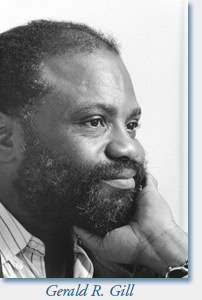 Gerald R. Gill died of a heart attack in his home in Cambridge, Massachusetts, on July 26, 2007. A scholar of 20th-century African American history, Gerald Gill was Tufts University’s most honored and distinguished teacher. In both 1995 and 1999, the Carnegie Foundation for the Advancement of Teaching and the Council for Advancement and Support of Education named Gill “Massachusetts College Professor of the Year.” He joined the history department in 1980. During his 27-year tenure, he won all of Tufts University’s awards for distinguished teaching, advising, and service. He was the inaugural recipient of many such awards. Indeed, his standard was so high, colleagues joked that he should simply hold all the awards “in perpetuity.” Among his many teaching and advising honors, he was the inaugural winner of Tufts Community Senate’s Professor of the Year Award (1999), the Lerman-Neubauer Prize for Outstanding Teaching and Advising (1998), and the Distinguished Service Award (2000), which was subsequently named the Gerald R. Gill Distinguished Service Award.
Gerald R. Gill died of a heart attack in his home in Cambridge, Massachusetts, on July 26, 2007. A scholar of 20th-century African American history, Gerald Gill was Tufts University’s most honored and distinguished teacher. In both 1995 and 1999, the Carnegie Foundation for the Advancement of Teaching and the Council for Advancement and Support of Education named Gill “Massachusetts College Professor of the Year.” He joined the history department in 1980. During his 27-year tenure, he won all of Tufts University’s awards for distinguished teaching, advising, and service. He was the inaugural recipient of many such awards. Indeed, his standard was so high, colleagues joked that he should simply hold all the awards “in perpetuity.” Among his many teaching and advising honors, he was the inaugural winner of Tufts Community Senate’s Professor of the Year Award (1999), the Lerman-Neubauer Prize for Outstanding Teaching and Advising (1998), and the Distinguished Service Award (2000), which was subsequently named the Gerald R. Gill Distinguished Service Award.
Since 1998 Gerald Gill served as deputy chair of the history department, but was also a founding and core faculty member of several interdisciplinary programs: American Studies, Africa in the New World Studies, and Peace and Justice Studies. His courses in African American history, the civil rights movement, and sports in American history always filled to capacity. The breadth of his knowledge, the creativity of his assignments, and his capacity to make the past come alive inspired generations of men and women.
Gerald Gill knew all of his students as individuals, and over the years, he came to know their partners and children. Some of us are lucky enough to have served as important mentors to a handful of students. Gerald Gill was the critical figure for scores if not hundreds of Tufts graduates of all backgrounds. His notorious generosity and accessibility as a teacher and scholar went beyond his classroom and into the Tufts and greater Boston community. He was a frequent interpreter of African American history and culture for community groups and Boston area public radio and television. Since 1988 Gill served as a consultant for many public television and Blackside, Inc., productions including The American Experience, Africans in America, This Far by Faith, I’ll Make Me a World, and Eyes on the Prize. He inspiringly led workshops and seminars with elementary and secondary schoolteachers.
Born in New Rochelle, New York, in 1948, he took his first degree in history from Lafayette College in 1970, and completed his PhD in U.S. history at Howard University in 1985. His scholarly interest in the history of African American opposition to the United States wars in the 20th century began with his dissertation and continued with publications on African American men’s and women’s opposition to the Vietnam War. Gill was a conscientious objector to the Vietnam War. He secured that status with help from Representative Shirley Chisholm.
Gill was co-author of The Case for Affirmative Action for Blacks in Higher Education, and author ofMeanness Mania: The Changed Mood, also about affirmative action programs, published by Howard University in 1978 and 1980 respectively. Almost 20 years later he documented Tufts’ small but distinguished community of black alumni in an exhibit entitled, “Another Light on the Hill: A History of Black Students at Tufts University, 1900 to the Present.”
He initiated his most recent research on “The Civil Rights Movement in Boston” as a National Endowment for the Humanities Fellow at the Schomburg Center for Research in Black Culture (1997–98). He has also held research fellowships at the W.E.B. DuBois Institute at Harvard University and the Center for Afro-American Studies at the University of California at Los Angeles. In November of 2006 he was the keynote speaker for the conference “Power, and Protest: The Civil Rights Movement in Boston, 1960–68” at the John F. Kennedy Library in Boston.
Gerald Gill was a model of black professionalism in a predominantly white institution, and a passionate New Yorker and Yankees fan in Boston. He forged pathways that transcended any and all potential divisions, famously greeting and enjoying friendships with the campus police, food services, and physical plant staff the same way he greeted and enjoyed his students, the faculty, and the university’s administration and trustees. On August 2, people from all across the university and broader community set down their various tools, and packed the university chapel beyond capacity to pay their respects to his daughter Ayanna Ettann Gill-McGee and bid farewell to this gentle and generous man.
Jeanne Marie Penvenne
Tufts University